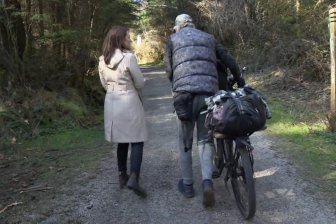Prime Minister Justin Trudeau made his inaugural visit to Mali on Saturday to thank the approximately 250 Canadians stationed at Camp Castor.

Due to concerns over security, though, the visit was a closely-guarded secret in advance of the trip.
Mali has seen surging violence in recent months, prompting officials to take careful measures to ensure nothing about the Prime Minister’s trip was revealed until after he left Mali’s airspace. Security concerns were so that high reporters were not even allowed to bring cell phones into the country.
WATCH: Prime Minister Justin Trudeau arrived in Mali on Saturday and paid a holiday visit to Canadian troops stationed there on a peacekeeping mission.

The UN peacekeeping mission in Mali matters to Trudeau because it represents more than just a Canadian commitment to helping the troubled Sahel region of Africa. It is also a symbol of Trudeau’s foreign policy ethos and a key campaign promise: a return to UN peacekeeping.
The reality, however, has proven more difficult than the catchy “Canada’s Back!” campaign slogan the Liberals used to push their peacekeeping pledge on the election trail. Despite pledging up to 600 peacekeepers and 200 police, Trudeau has delivered less than half that number of peacekeepers and no civilian police officers.
Facing desperate poverty, political upheaval and the exploitation of jihadists fomenting radical Islamist ideologies, violence and terrorism, West Africa is a region in need of help. Without help, the struggling African countries are unlikely to succeed, but that help comes at a cost in blood and treasure.
With the deaths of 177 peacekeepers in Mali — 22 of whom were killed this year alone — Mali is the most dangerous peacekeeping mission in UN history.
The Trudeau government committed an air task force comprised of three Chinook helicopters and five smaller Griffons to support the UN mission. The helicopters conduct medical evacuations and provide logistical support, moving troops and equipment to the front lines. It one of the least dangerous roles, but it’s not without risk. Military officials told reporters that, so far, Canadian troops have not been fired upon and haven’t shot at anyone on the ground to date.
WATCH: Exclusive: Inside the lives of Canadian peacekeepers in Mali

There also hasn’t been much demand for the Canadians’ services. Canadian troops have only carried out five medical evacuations since arriving in July and only one of those was combat related.
But the low level of demand does not reflect a drop in violence. It indicates that the violence is moving south, away from where the Canadians are located. Canadian military officials told reporters on the trip that violence in the country overall is on the rise.
Canadian Task Force Commander Col. Chris McKenna argued that the handful of missions doesn’t reflect a lack of importance, or need. The knowledge that Canada is there to provide first-class medical evacuation has given other UN troops the confidence to go out and patrol the dangerous, bomb-strewn roads.
The Canadian troops have also used their time to train and innovate. The Canadian Armed Forces have been known for their innovation since the First World War, and Mali has thus far been no exception.
Large Chinook helicopters were sent to Mali, with the United Nations intending them to be used as flying ambulances. The Canadian medical teams, though, took it to the next level, turning them into flying trauma wards. For the first time, the Canadians say, trauma surgeons and nurses are on board the helicopters — being brought to the patient to reduce the critical time between injury and treatment. Known as the “golden hour” by first responders, the time needed to get a major trauma victim to treatment has a significant influence on the likelihood of survival. By bringing Canadian doctors to the injured patient on the helicopter when they are evacuated, chances for survival are improved.
WATCH: Defence Minister discusses Canada’s Mali mission

The Canadians are also bringing blood products into the field and immediately transfusing them into patients who have been severely injured. The change is promising and a significant turn from how casualties were treated in Afghanistan, where they were administered saline via IV units.
Defence Minister Harjit Sajjan, who was also on the trip, remarked that he wished the sort of improvements the Canadians have devised in Mali had been available in Afghanistan.
Despite successes, the government has reportedly ignored requests for Canada to stay in Mali and do more.
WATCH: Is Canada’s mission peacekeeping or counterterrorism?

When the Canadians pull out, there will be an operational gap until Romania takes over. But on the ground in Mali, the Prime Minister would not commit to staying for longer or additional UN missions.
Trudeau was asked directly if the resistance was related to concerns about casualties in an election year, but didn’t respond to the question. Instead, he cited the successes of Canadian troops on the ground.
The big challenge for Mali is what will happen in the long term. While the Canadian contribution has been substantial, the UN mission in the country is struggling. There is a lack of a long-term, coordinated situation to help Mali and the surrounding Sahel deal with the scourge of terrorism and the underlying risk factors.





















Comments